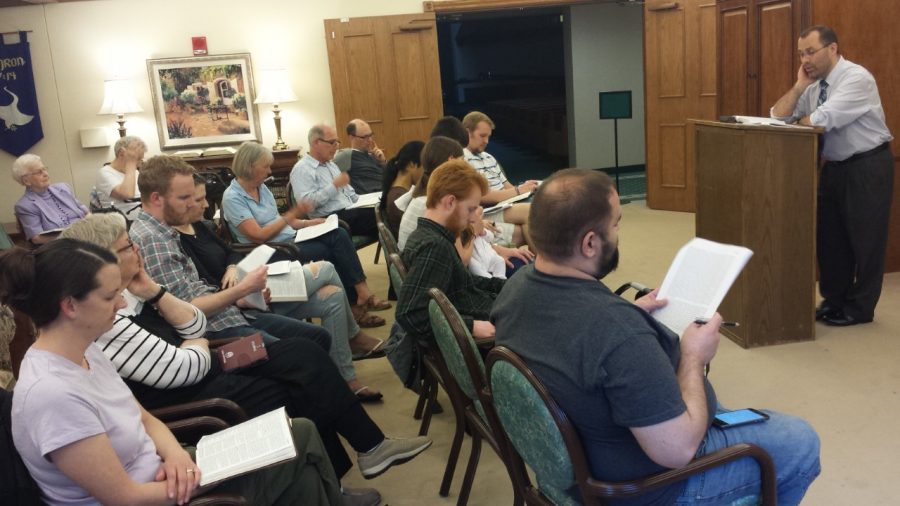Semper Reformanda: part one
Dr. David Noe speaking in front of a multi-generation Bible study he began last spring. Photo courtesy David Noe.
What is the most urgent question of our times? Is it gun-control? Abortion? Racial injustice? After ten years of reflecting on the Bible and the writings of St. Augustine, on October 31, 1517 a 34-year-old monk named Martin Luther nailed his answer to the door of the church in Wittenberg, Germany.
Written as topics inviting debate, Luther’s 95 Theses sought to recover a profound insight: “Since we have been justified by faith, we have peace with God through our Lord Jesus Christ.” Paul’s words from Romans 5 imply that the most pressing issue of every time is the resolution of a question of eternal consequence. We can put this very simply: what is wrong with me and how can it be fixed?
In Luther’s time, the church to which he belonged was like a large, twisted rope. It contained many strands of teaching that when casually observed looked similar and unified. On closer inspection, and Luther was driven to that by a very active conscience, it turned out that some of these teachings agreed with the Scriptures and others did not. The particular debate was over indulgences, a Latin word that originally meant “kindness” and came to mean the forgiveness of debt. An indulgence was a purchased certificate intended to assure the believer that her confessed sins had really been forgiven. Like many destructive ideas, it began with a good intention: providing peace to a troubled conscience.
As Luther thought about these questions, he came to doubt that indulgences could offer struggling sinners any comfort. Luther saw clearly that the theology behind them – “the forgiveness granted by the Church of the temporal punishment due to sins already forgiven” (Baltimore Catechism 435) – rendered meaningless Christ’s once-for-all payment of our debt of sin (Hebrews 9.28). He came to believe instead that what Augustine had said (Confessions 10), “Give us what you require, and require what you want” was the only proper way to understand our relationship to God. To put it more plainly, there is no way that any of us, by any amount of effort, striving and works, can satisfy the strict and perfect righteousness of a holy God. The only way to erase all of the cruel and selfish things we think, say and do each day is to throw ourselves entirely on God’s mercy, as beggars, and trust in Christ’s completed work. Did he not say ‘It is finished’ (John 19.30)?
How can we receive this redemption that Christ purchased for us by his obedience and suffering? In the 1640s, the Westminster Shorter Catechism (Q&A 88) gave a concise answer: “The outward and ordinary means whereby Christ communicates to us the benefits of redemption, are his ordinances, especially the word, sacraments, and prayer; all which are made effectual to the elect for salvation.”
As we consider the 500th anniversary of Luther’s invitation to debate, you are invited to consider with me, in this series of articles, the place of God’s word, sacraments and prayer in your life. Soli Deo gloria.




